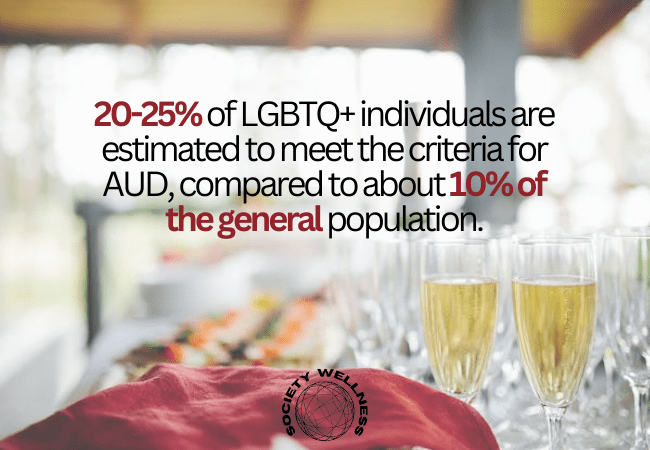For individuals in recovery from alcohol addiction, the question “Can an alcoholic ever drink again?” is one of the most common yet misunderstood inquiries. The simple answer, grounded in research and clinical practice, is no. Alcohol addiction is a chronic condition, and resuming alcohol use—no matter how minimal—can lead to relapse and undo progress toward recovery.
In the LGBTQ+ community, this question takes on additional layers of complexity due to the unique challenges faced by individuals, such as stigma, discrimination, mental health disparities, and the normalization of alcohol in certain LGBTQ+ social spaces. This blog explores why individuals recovering from alcohol addiction should remain abstinent, the unique considerations for LGBTQ+ individuals, and how specialized programs like LGBTQ Alcohol Addiction Treatment and LGBTQ Mental Health Programs can provide tailored support for lasting recovery.
Why Alcoholics Cannot Drink Again
Alcohol addiction, or alcohol use disorder (AUD), is not just a pattern of excessive drinking—it is a chronic brain disorder. Even after achieving sobriety, the neurological changes caused by addiction do not fully revert to their pre-addiction state, making it nearly impossible to control alcohol intake once drinking resumes.
1. Alcoholism as a Chronic Disease
- Addiction rewires the brain’s reward system, causing it to associate alcohol with pleasure and relief.
- For individuals with a history of AUD, even one drink can activate these pathways, leading to uncontrollable cravings and compulsive drinking.
2. Risk of Relapse
- Research indicates that up to 90% of alcoholics who try to resume moderate drinking relapse within the first year.
- Relapse often leads to a rapid return to previous patterns of heavy drinking or worse, putting recovery and overall health at risk.
3. Emotional and Behavioral Triggers
- Alcohol impairs judgment and lowers inhibitions, making it difficult to stop at “just one drink.”
- Stress, loneliness, or exposure to social drinking environments can quickly lead to overconsumption.
Unique Challenges for LGBTQ+ Individuals in Recovery
The LGBTQ+ community experiences disproportionately high rates of alcohol use disorder compared to the general population. Understanding the specific factors that contribute to these disparities is crucial for supporting recovery.
1. Higher Rates of Alcohol Misuse
- Studies show that LGBTQ+ individuals are nearly twice as likely to develop alcohol addiction compared to heterosexual individuals.
- The prominence of bars and clubs as safe spaces in LGBTQ+ culture can normalize heavy drinking, making it harder for individuals to recognize problematic patterns.
2. Minority Stress and Discrimination
- LGBTQ+ individuals face unique stressors, including discrimination, rejection, and stigma.
- These experiences contribute to higher rates of anxiety, depression, and PTSD, often leading to alcohol use as a coping mechanism.
3. Limited Access to Inclusive Care
- Traditional addiction treatment programs may not address the unique needs of LGBTQ+ individuals, such as navigating identity-related challenges or providing affirming support.
- Specialized programs like LGBTQ Addiction Centers create safe spaces for healing and growth.
The Importance of Abstinence in Recovery
For LGBTQ+ individuals recovering from alcohol addiction, the decision to abstain from alcohol is critical for long-term success. Remaining sober allows individuals to focus on rebuilding their lives, improving mental health, and fostering meaningful relationships.
1. Breaking the Cycle of Dependency
- Abstinence prevents the activation of addiction pathways in the brain, reducing the risk of relapse.
- It allows individuals to address the underlying causes of their alcohol use, such as unresolved trauma or mental health conditions.
2. Rebuilding Mental and Emotional Health
- Sobriety provides a clear mind and emotional stability, which are essential for working through challenges like stigma or identity struggles.
- Therapy within LGBTQ Mental Health Programs helps individuals develop healthier coping mechanisms.
3. Creating Supportive Environments
- Abstinence encourages the formation of supportive, alcohol-free relationships and communities.
- LGBTQ-specific recovery groups offer safe spaces to share experiences and celebrate milestones.
Specialized Treatment for LGBTQ+ Individuals
Recovery is not a one-size-fits-all process. LGBTQ-specific programs address the unique challenges faced by the community, providing affirming and tailored care.
1. LGBTQ Alcohol Addiction Treatment
- Purpose: To help LGBTQ+ individuals detox, recover, and build sober lives while addressing identity-specific challenges.
- Key Features: Safe, affirming spaces and therapy that incorporates the unique experiences of LGBTQ+ individuals.
2. LGBTQ PHP Treatment Program (Partial Hospitalization Program)
- What It Offers: Intensive therapy, medical care, and skill-building during the day, with the flexibility to return home in the evening.
- Benefits: Combines comprehensive support with the ability to maintain personal responsibilities.
3. LGBTQ IOP Treatment Program (Intensive Outpatient Program)
- What It Offers: Therapy and support that fit around work, school, or family commitments.
- Benefits: Provides ongoing care and tools to maintain sobriety while living independently.
4. LGBTQ Evening Outpatient Treatment
- What It Offers: Flexible evening sessions for those unable to attend treatment during the day.
- Benefits: Ensures access to care for individuals balancing busy schedules.
5. LGBTQ Mental Health Programs
- Purpose: To address co-occurring conditions such as anxiety, depression, or PTSD that often accompany alcohol addiction.
- Benefits: Provides tools for emotional resilience and long-term recovery.

Strategies for Long-Term Sobriety
Maintaining sobriety is an ongoing process that requires dedication, support, and self-awareness. Here are key strategies for LGBTQ+ individuals in recovery:
1. Build a Support Network
- Surround yourself with affirming individuals who support your decision to stay sober.
- Participate in LGBTQ-specific recovery groups for peer encouragement and shared understanding.
2. Develop Healthy Coping Mechanisms
- Replace alcohol use with constructive activities like exercise, mindfulness practices, or creative hobbies.
- Work with a therapist to develop tools for managing stress and emotional triggers.
3. Avoid High-Risk Situations
- Identify environments or relationships that may tempt you to drink, such as social gatherings centered around alcohol.
- Plan ahead by bringing non-alcoholic beverages or attending sober events.
4. Celebrate Milestones
- Acknowledge and reward yourself for achieving sobriety milestones, no matter how small.
- Reflect on your progress to reinforce your commitment to recovery.
Why Choose LGBTQ Addiction Centers?
At LGBTQ Addiction Centers, we provide specialized care tailored to the needs of LGBTQ+ individuals. Our evidence-based programs combine medical expertise with affirming support to ensure comprehensive recovery.
Key Features:
- Inclusive Care: Safe, welcoming environments that respect and affirm LGBTQ+ identities.
- Integrated Treatment: Programs like LGBTQ PHP Treatment and LGBTQ Mental Health Programs address both addiction and co-occurring conditions.
- Experienced Staff: Clinicians trained to understand the unique challenges faced by LGBTQ+ individuals.
- Community Support: Opportunities to connect with peers who share similar experiences.
Conclusion
For individuals recovering from alcohol addiction, the notion of drinking again can be tempting but is ultimately a risk that jeopardizes recovery. Alcoholism is a chronic disease, and even one drink can lead to relapse. This is especially significant for LGBTQ+ individuals, who often face additional challenges in their recovery journey.
With the right support, sobriety is not only achievable but sustainable. Programs like LGBTQ Addiction Treatment and LGBTQ Alcohol Rehab Treatment provide the tools and affirming care necessary for a healthier, alcohol-free life. If you or a loved one is struggling with alcohol addiction, contact LGBTQ Addiction Centers today to start your journey toward recovery. Reach out to us at (888)964-8116 to learn more about our specialized programs and how we can support your journey to recovery.
FAQs About Alcohol Addiction and Recovery
Can an alcoholic ever safely drink again?
No, alcoholics should not drink again. Alcoholism is a chronic disease, and even a single drink can trigger a relapse.
Why is abstinence important for recovery?
Abstinence prevents reactivation of addiction pathways in the brain, reducing the risk of relapse and supporting long-term sobriety.
Are LGBTQ+ individuals more likely to struggle with alcohol addiction?
Yes, LGBTQ+ individuals are nearly twice as likely to develop alcohol addiction due to factors like stigma, discrimination, and the normalization of heavy drinking in some LGBTQ+ spaces.
What are the risks of relapse if an alcoholic drinks again?
Relapse often leads to a rapid return to harmful drinking patterns, undoing progress and increasing the risk of physical, emotional, and social harm.
What treatment options are available for LGBTQ+ individuals with alcohol addiction?
Programs like LGBTQ Alcohol Addiction Treatment, LGBTQ PHP Treatment Programs, and LGBTQ IOP Treatment Programs offer tailored support to meet the unique needs of LGBTQ+ individuals.
How does LGBTQ-specific treatment differ from traditional rehab programs?
LGBTQ-specific treatment provides affirming spaces, addresses identity-related challenges, and incorporates peer support from others in the community.
Can co-occurring mental health issues be addressed during recovery?
Yes, programs like LGBTQ Mental Health Programs treat co-occurring conditions like anxiety, depression, or PTSD alongside alcohol addiction.
How can someone in recovery handle social events where alcohol is present?
Plan ahead by bringing non-alcoholic drinks, setting boundaries, and attending events with a supportive friend or sober companion.
Is it possible to live a fulfilling life without alcohol?
Absolutely. Sobriety opens the door to improved mental health, stronger relationships, and the pursuit of meaningful goals.

